Fiji is not the biggest worry in the region, argues David Robie, Indonesian repression in West Papua, the climate of impunity in the Philippines where journalists are assassinated and human rights violations over asylum seekers are more serious. Dr Robie's speech at the launching of his new book, Don't Spoil My Beautiful Face: Media, Mayhem and Human Rights in the Pacific.
Kia ora tatou, Ni sa bula and warm Pacific greetings.
Thanks to Television New Zealand’s Sandra Kailahi and Barbara Dreaver and all those who have come along this evening.
Firstly, many thanks to all those who have contributed to this book in many ways and also for my journey to reach these pages.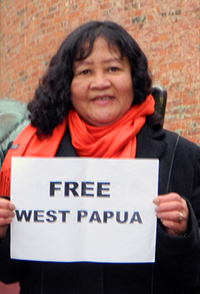 Chief on my list is my wife, Del Abcede, to whom the book is dedicated for her long-time commitment to human rights and activism.
Chief on my list is my wife, Del Abcede, to whom the book is dedicated for her long-time commitment to human rights and activism.
When I first met her she had been campaigning for the end of the Marcos dictatorship in the Philippines and was a critical help for me when investigating a controversial New Zealand aid project on the island of Mindanao.
And for the past two decades she has kept me on track, not only with this book but many other projects. Without her, I wouldn’t have got this book completed.
For those of you have had a chance to actually look at Don’t Spoil My Beautiful Face, you may have been surprised by the long list of acknowledgements.
Three decades
It even surprised me. But when you consider this book spans more than three decades of Pacific reportage and challenges, I had many people who helped me at key periods along the way.
There was the Kanaky era. There was the Te Ao Maohi era; the Environmental journalism era … There was the Rainbow Warrior era. And then on to my 10 years living in Papua New Guinea and Fiji.
Sadly, some of these people who have been crucial to my journey have passed on, to name peace researcher Owen Wilkes and French Polynesian stalwarts Marie-Therese and Bengt Danielson among them. Bengt was on Thor Heyerdahl’s 1947 Kon Tiki raft expedition from Peru to Tahiti.
I thank them all for their contribution and support.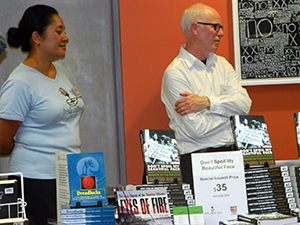 And I especially want to thank Tony Murrow, Evotia Tamua, Robyn Bern, Mike Wagg, Amy Tansell and all the team at Little Island Press to make all this possible. They’re all named in the book.
And I especially want to thank Tony Murrow, Evotia Tamua, Robyn Bern, Mike Wagg, Amy Tansell and all the team at Little Island Press to make all this possible. They’re all named in the book.
Little Island may be a small publisher, as its name suggests, but kapai for such a huge effort.
And now some comments about Don’t Spoil My Beautiful Face and the issues it raises.
Unorthodox approach
Some might find the book has an unorthodox approach. For two-thirds of the content, I took essentially an episodic series of my articles – and with the advantage of hindsight put them in context while retaining the integrity of the original writing.
One of the frustrating elements of news media is the inability to retain more than a short-term memory about events as they unfold. And so often the context is simply absent.
I wanted to pick up from where I left off with my Blood On Their Banner in 1989 and Tu Galala in 2002 and provide fresh insights.
Also, in 1994 I launched Pacific Journalism Review, which in 20 years has forged an enviable reputation for investigative journalism and independent research unshackled by the agendas of donor organisations.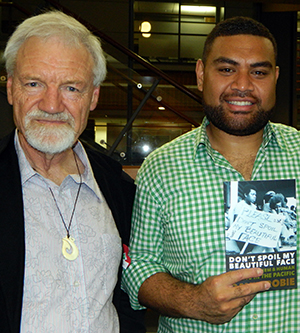 This style of journalism actually led to a methodology which I developed after I became a media educator while I was at the University of Papua New Guinea University of the South Pacific.
This style of journalism actually led to a methodology which I developed after I became a media educator while I was at the University of Papua New Guinea University of the South Pacific.
It has been evolving ever since here at AUT University. It is called critical development journalism, not to be confused with forms of development journalism misrepresented by many Pacific politicians seeking to avoid public accountability.
Critical development journalism is a robust form of journalism investigating political and social process and policy. It is still speaking truth to power, but as well as seeking accountability it tries to find a constructive edge leading to solutions.
The Asia-Pacific region is poorly reported and under reported in the New Zealand media and has been for years.
RNZI praised
Only one institution consistently covers itself with credit when covering the region and that is Radio New Zealand International. Although Māori Television’s current affairs programme Native Affairs has done some excellent Pacific work.
Spasifik magazine and TVNZ’s Tagata Pasifika programme also do first class work.
Although RNZI only has a fraction of the resources of its cousin across the Tasman, Radio Australia plus ABC Television, it does an excellent and creditable job.
But with the honourable exceptions of individual journalists such as TVNZ’s Barbara Dreaver and Fairfax Media’s Michael Field – both banned by the Bainimarama regime in Fiji – the mainstream and legacy media is patchy at best in coverage of the region.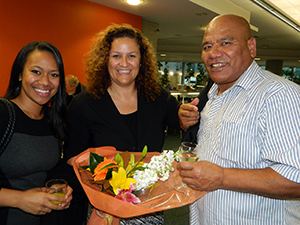 The poor level of reporting means that we are frequently misinformed or we get a one-dimensional view of developments, which is barely half the story.
The poor level of reporting means that we are frequently misinformed or we get a one-dimensional view of developments, which is barely half the story.
Our treatment of Fiji is an example of this. The hypocrisy and double standards over the reporting of radical changes in post-coup Fiji have not only blinded us about the realities but also prevented us seeing other critical issues around the region.
In many respects, the illegal Bainimarama regime has been a pariah ever since the military coup in 2006.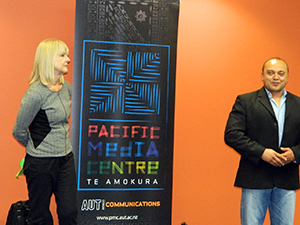 So-called democracy
So-called democracy
But it shouldn’t be forgotten though that the so-called “democracy” that was overthrown was actually an extremist and corrupt ethno-nationalist regime masquerading as democratic.
Also, the reality is that this same military backed regime is likely to become the elected government in the general election in September.
Orchestrated and manipulated, perhaps. But the regime does have a lot of genuine support in rural areas and it least it opens the door to a return to real democracy.
For the doomsayers there is very little difference from when the original coup leader Sitiveni Rabuka made the transition from hardline military dictator to elected prime minister in 1992.
Paranoia reigns when the regime’s bureaucrats deal with the media and there is a climate of timid self-censorship in Fiji under the control of the dictatorial Media Industry Development Tribunal – except for a handful of courageous and dissident journalists such as Ricardo Morris and his Republika magazine.
The Electoral Decree’s exclusion of NGOs that receive foreign funding grants is the latest dictatorial act by the regime. Actually, though, Fiji is not the biggest worry in the region by a long shot.
Indonesian repression in the two Melanesian provinces that make up the West Papua region and the climate of impunity in the Philippines where journalists are assassinated with ease are serious crises in the region.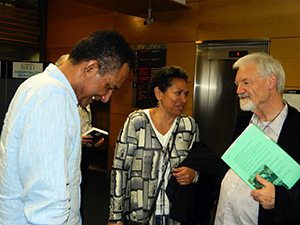 Hidden issues
Hidden issues
But when do you read about these issues in the New Zealand media?
At least 206 journalists have been murdered in the Philippines since 1986—34 of them in the Ampatuan massacre in Mindanao in 2009. More than four years later nobody has been convicted for these atrocities.
The Philippines is a far more dangerous place for the media under democracy than it was under the Marcos military dictatorship.
And now a controversial law in the Philippines billed by critics as an “electronic martial law” that criminalises e-libel may be mimicked in the Pacific.
The Supreme Court in Manila ruled in December 2012 to temporarily suspend this law and then extended it until further notice in February 2013.
However, in February this year, the Supreme Court ruled that the law was indeed constitutional, “effectively expanding the country’s 80-year-old libel law into the digital domain”.
Now in Papua New Guinea the Peter O’Neill government has signalled an impending onslaught against stridently critical social media with a draft new cyber-crime law.
Digital powers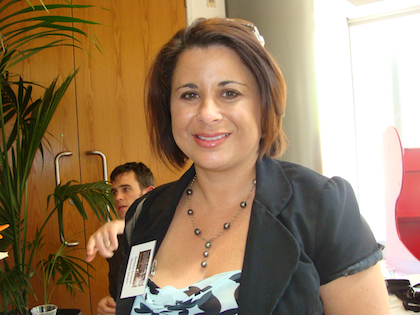 Under proposed legislation recently considered by the cabinet in Port Moresby, the National Information and Communication Technology Authority (NICTA) would be granted powers to act against individual attacks on social media.
Under proposed legislation recently considered by the cabinet in Port Moresby, the National Information and Communication Technology Authority (NICTA) would be granted powers to act against individual attacks on social media.
The agency would be able to routinely monitor SIM cards with a “full biometric scan” and it would become illegal for people to use pseudonyms for social media postings.
Bloggers in Papua New Guinea are up in arms about the proposed legal powers.
Opposition Leader Belden Namah has described this development as “dangerous” for Papua New Guinea’s traditional freedom of speech. He says Prime Minister O’Neill should grow a thick skin.
The proposed PNG legislation mirrors in some respects the Cybercrime Prevention Act in the Philippines where an offender can be imprisoned for up to 12 years without parole and the law is regarded by critics as a violation of Article 19 of the International Covenant on Civil and Political Rights.
Truth is not recognised as a defence.
Last month in Thailand, the indictment of two journalists, Alan Morison and Chutima Sidasathian, for alleged criminal libel under a similar Computer Crime Act “may spell doom” for the online news website Phuket Wan.
Critical front line
West Papua is the most critical front line for defending media freedom in the South Pacific at present. The West Papua Freedom Flotilla last September focused unprecedented global attention on human rights and freedom of expression in the Indonesian-ruled region.
Vanuatu Prime Minister Moana Carcasses Kalosil challenged the United Nations Human Rights Council last month to act decisively to end the “international neglect” of the West Papuan people.
Since the controversial Act of Free Choice in 1969, the Melanesian People of West Papua have been subject to ongoing human rights violations committed by the Indonesian security services. The world has witnessed the litany of tortures, murders, exploitation, rapes, military raids, arbitrary arrests and dividing of civil society through intelligence operations…
In this climate of fear and repression of political dissent, and blatant negligence by the international community including the UN and the powerful developed countries since 1969, we find this forgotten race still dare to dream for equality and justice. Yet the democratic nations have kept silent.
New Zealand is among these silent nations – and nowhere was this landmark speech reported in the New Zealand media.
But serious though the West Papuan plight is, the spectre of climate change hangs over the entire Pacific while the major industrial powers dither over serious and urgent carbon policy reforms.
Another media freedom issue is Australia’s alleged human rights violations and suppression of information about asylum seekers leading to inquiries into the killing of 23-year-old Iranian Reza Barati while in custody on Manus Island.
Detention camps
More than 3000 asylum seekers are living in detention camps in Nauru and Papua New Guinea deprived of their human rights and with no hope for the future.
Through the so-called “Pacific Solution”, Australia has simply attempted to dump responsibility on two nations for a price.
Journalism must fundamentally change in the Pacific to cope with the challenges. Far more investigative journalism is needed - or, as I would say, more critical development journalism.
More education and training is needed and not just the sort of self-interested short-term training served up by donor agencies.
Finally, I would like to conclude with a quote from Martin Luther King:
"No, no, we are not satisfied, and we will not be satisfied until justice rolls down like waters and righteousness like a mighty stream."
Don’t Spoil My Beautiful Face: Media, Mayhem and Human Rights in the Pacific is available from Little Island Press.
Barbara Dreaver's book launch speech
This work is licensed under a Creative Commons Attribution-NonCommercial 3.0 New Zealand Licence.
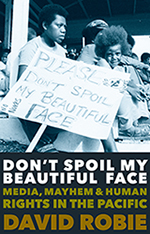 MORE ARTICLES
MORE ARTICLES
Sedition, e-libel the new media frontline
'Climate of censorship' chills Pacific media scene
New free press book a must read for 'media spoilers'
New book focusing on 'secret history' of the Pacific [audio]
David Robie's new book should be on shelves of Pacific newsrooms
New book on South Pacific journalism looks at region's history and challenges
David Robie blasts media attackers at book launch [video]
Journalism can be an agent of peace
Gavin Ellis reviews the book on Radio NZ [audio]
E-libel laws the new frontline in the Pacific battle for press freedom [The Conversation]
Richard Aedy interviews David on ABC Media Report [audio]




